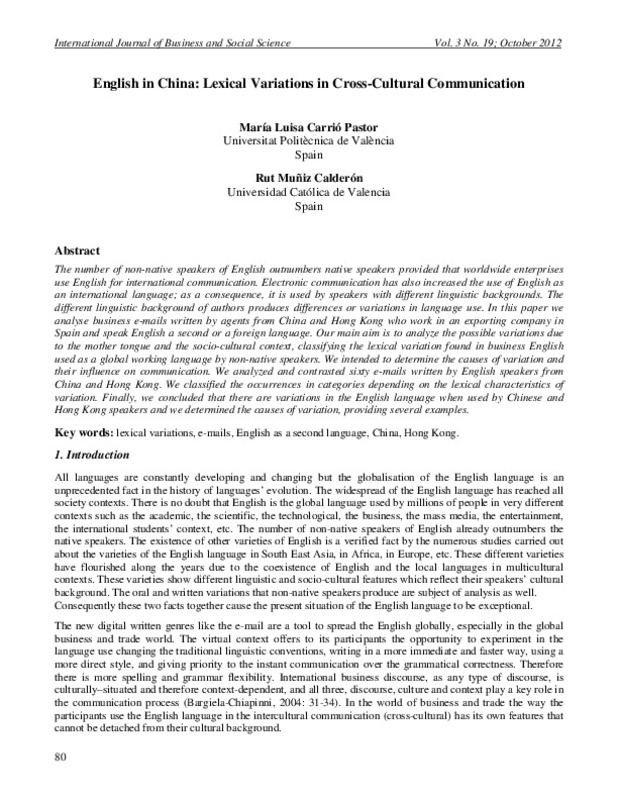JavaScript is disabled for your browser. Some features of this site may not work without it.
Buscar en RiuNet
Listar
Mi cuenta
Estadísticas
Ayuda RiuNet
Admin. UPV
English in China: lexical variations in cross-cultural communication
Mostrar el registro sencillo del ítem
Ficheros en el ítem
| dc.contributor.author | Carrió Pastor, Mª Luisa
|
es_ES |
| dc.contributor.author | Muñiz Calderón, Rut
|
es_ES |
| dc.date.accessioned | 2017-02-21T15:08:36Z | |
| dc.date.available | 2017-02-21T15:08:36Z | |
| dc.date.issued | 2012-10 | |
| dc.identifier.issn | 2219-1933 | |
| dc.identifier.uri | http://hdl.handle.net/10251/78136 | |
| dc.description | International Journal of Business and Social Science (IJBSS) is an open access, peer-reviewed, and refereed journal published by Center for Promoting Ideas (CPI), USA. The main objective of IJBSS is to provide an intellectual platform for the international scholars. IJBSS aims to promote interdisciplinary studies in business and social science and become the leading journal in business and social science in the world. | es_ES |
| dc.description.abstract | The number of non-native speakers of English outnumbers native speakers provided that worldwide enterprises use English for international communication. Electronic communication has also increased the use of English as an international language; as a consequence, it is used by speakers with different linguistic backgrounds. The different linguistic background of authors produces differences or variations in language use. In this paper we analyse business e-mails written by agents from China and Hong Kong who work in an exporting company in Spain and speak English a second or a foreign language. Our main aim is to analyze the possible variations due to the mother tongue and the socio-cultural context, classifying the lexical variation found in business English used as a global working language by non-native speakers. We intended to determine the causes of variation and their influence on communication. We analyzed and contrasted sixty e-mails written by English speakers from China and Hong Kong. We classified the occurrences in categories depending on the lexical characteristics of variation. Finally, we concluded that there are variations in the English language when used by Chinese and Hong Kong speakers and we determined the causes of variation, providing several examples. | es_ES |
| dc.language | Inglés | es_ES |
| dc.publisher | Center for Promoting Ideas (CPI) | es_ES |
| dc.relation.ispartof | International Journal of Business and Social Sciencies (Print) | es_ES |
| dc.rights | Reserva de todos los derechos | es_ES |
| dc.subject | Lexical variations | es_ES |
| dc.subject | e-mails | es_ES |
| dc.subject | English as a second language | es_ES |
| dc.subject | China | es_ES |
| dc.subject | Hong Kong | es_ES |
| dc.subject.classification | FILOLOGIA INGLESA | es_ES |
| dc.title | English in China: lexical variations in cross-cultural communication | es_ES |
| dc.type | Artículo | es_ES |
| dc.rights.accessRights | Abierto | es_ES |
| dc.contributor.affiliation | Universitat Politècnica de València. Escuela Técnica Superior de Ingeniería Geodésica, Cartográfica y Topográfica - Escola Tècnica Superior d'Enginyeria Geodèsica, Cartogràfica i Topogràfica | es_ES |
| dc.description.bibliographicCitation | Carrió Pastor, ML.; Muñiz Calderón, R. (2012). English in China: lexical variations in cross-cultural communication. International Journal of Business and Social Sciencies (Print). 3(19):80-87. http://hdl.handle.net/10251/78136 | es_ES |
| dc.description.accrualMethod | S | es_ES |
| dc.relation.publisherversion | http://ijbssnet.com/journal/index/1570 | es_ES |
| dc.description.upvformatpinicio | 80 | es_ES |
| dc.description.upvformatpfin | 87 | es_ES |
| dc.type.version | info:eu-repo/semantics/publishedVersion | es_ES |
| dc.description.volume | 3 | es_ES |
| dc.description.issue | 19 | es_ES |
| dc.relation.senia | 238753 | es_ES |
| dc.identifier.eissn | 2219-6021 |






